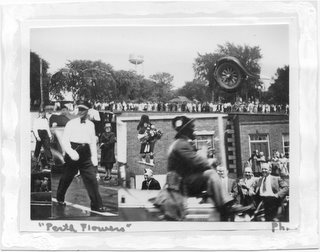I am who I am because my little pen knows me; knows when to listen, and knows when to lead. There is a time for fiction, and there is a time for poems. There is a time for non-fiction, writing Glengarry County or an essay on Phil Hall; there is a time for any and every project under the sun (so too, a time to drink beer, and a time to watch television). Most of the time I work a number of projects concurrently, but can't work on anything if the muse (for lack of a better word) isn't there. Sometimes you just have to wait.
Most people don’t know that I've been writing fiction on an ongoing basis since 1996, writing book upon book upon book. Anything I write a whole unit, so there has been nothing to excerpt for the sake of a magazine. Three novels abandoned, and three others I so desperately work to finish.
Last spring, from the ash of a recent romantic trauma, I wrote the first flecks of a novel called Unfinished. After years of working variations of the book as my unit of composition, I have somehow thought better in novels (or, novellas, as I've been told) than in any shorter forms of fiction (I have never been able to properly write a short story). Taking a page from Sebald, I took the floorboards of fact and wrote them out as an eventual fiction, writing two threads of mothers from the natural to the adopted; from points of origin up until the points of almost-contact. I've probably abandoned more novels than some people have written, spending years on a project before realizing its failures overwhelm whatever strengths might be there, and have spent years writing away from my own story and stories, for various reasons. My first attempt, "Place," wrote a form of myself that went nowhere; I've spent years working to abandon my own story, in favour of something else.
In Unfinished, the book works a narrator with my name who lives in Ottawa, with both of us the same age, but both of us different, too. As Ivan Klíma wrote at the beginning of Love and Garbage, "None of the characters in this book – and that includes the narrator – is identical with any living person." Writing versions of ourselves that are not ourselves; in how many books so far, New York novelist Paul Auster writing Paul Auster, or, "Paul Auster."
Writing details of life and then shaking them, using such as foundation and then going out in other directions. There are facts in the novel that are true, and other facts that are complete fabrications. In the end, does it matter? There are parts of the novel that have never happened, at least to me. Information there I would certainly never know. In the anthology Writing Life: Celebrated Canadian and International Authors on Writing and Life (Toronto ON: McClelland & Stewart, 2006) [see my review of it here], Newfoundland fiction writer Michael Winter talks about writing his own life and family for his first couple of books, but writing too close, until some of his subjects rebelled; he had then to move outside of personal fact. He had to move beyond him.
Use everything, I've heard. You pick up all the odds and ends of suggestion of what to write, even how. We battle laziness and lies in our search for the truth. Or so I've been told. I boil everything I am and I know and I don't know down to books; in the end, my books and my daughter, and those that might eventually follow, might be all that is left of me; all that is left of my family.I live in Toronto now, but I grew up in Newfoundland. The first three books I wrote were influenced by things that happened to me in Newfoundland. My early stories were largely autobiographical, and when you write from that kind of material, you learn how to make it interesting to a reader who knows, or cares, nothing about your life.
All this changed when people I loved started to tell me they were hurt by the way I was writing about them. My brother, for instance, said that if I wrote about him again, he'd deliver a punch to my head from which I might not recover.
So I decided to write an historical novel. I saw a travelling exhibit of Rockwell Kent's Newfoundland work and thought his life would make a good novel. He was pretty much forgotten, out of fashion, but in his day the New Yorker published this ditty:
That day will mark a precedent
which brings no news of Rockwell Kent
I thought a memoir of an old man reflecting on his foolish youth would make a good book, and it would solve the issue of my writing about people I know and love.But I'm not very good at research. (pp 407-8)
A few years ago, it was in the midst of another female character, working my own version of Persephone in the novella White; living in the suburbs, a fictionalized Nepean, which then was her version of "Hell." Left alone during the day in a house by her new husband, the book starts in September, and by the spring she has disappeared into air. The thing that eventually troubled me, while working out the rest of the story, was in having to decide whether or not the story was actually happening to her, or if it was a story happening in her own head, overlaying someone else's onto her own. A character as far away from myself I find easier to write, and easier to imagine, than if I was writing too close. When a friend of mine flipped pages of the manuscript at the pub, she looked to the two men across from her, myself included, and forgot who she was speaking to, saying of one of the sections, "You wouldn’t understand this section, because you're men." It's an interesting way to find out how well I'd accomplished, having someone forget in a matter of minutes who the author was.
In the novel Missing Persons [see a fragment of it here], I'm currently writing a fourteen year old female main character, growing up in a fictionalized Lumsden, Saskatchewan in the 1980s. There is something about being so far out of myself that I am forced then to write; if a male character, it would have been too close, always too close, and always writing myself. To write Alberta in her unnamed-Saskatchewan is then to be forced to actually write. I can only imagine, and do (and I've been corrected on details, here and there). Is this voice appropriation? To write anyone not myself is to appropriate voice; I write fiction, not memoir. I will never be writing myself, even if I am. Even memoir is a kind of memory fiction. It will always be another version.
This novel feels bigger than the other two I'm trying to finish; this one feels as though it could take a while to work its way clear. Started as a prequel to another novel I was tinkering with, I felt as though I didn't have enough of a grasp of one of the characters, so started working on her story, and it quickly overwhelmed. She started as a twenty-something character in a group of characters, in a fictionalized Ottawa, writing the novel Signal Fires, and the moody young girl from the west with a trauma behind her. A trauma the reader did not need to know, but one she was working to write out of her system, writing her own story as excorcism. Feeling through the air what the eyes could no longer see. Will I ever return to the "main" novel itself, or has the prequel completely taken over?
I like the idea of fictionalizing a place that isn't necessarily mentioned; that way, if you are familiar with the place itself, you have a sense of what you think that means. If you don't, your reading won't be coloured by the experience. I don’t want my sense of place to be marginalized through what the reader has decided already, through naming names instead of working a particular kind of description. Depending on what you already know, you could probably place whole sections of either of these two books.
I have always wanted to write a novel in four sections published as entirely separate units, packaged together in a box with four spines. How the novel shapes in your head would depend entirely on the order in which you read the four sections. It would mean something far different to have a character walk through a party if you have seen them in another section already die. But now that I have said this idea out loud, perhaps I never will. Perhaps I never can.









